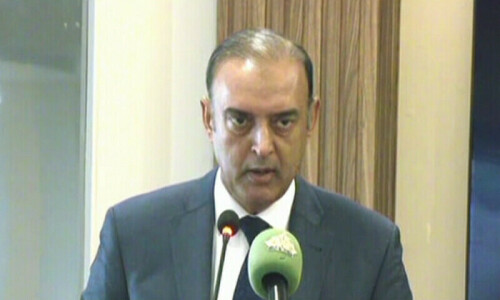ISLAMABAD, July 8: Minister for National Food Security and Research Sikandar Hayat Bosan said on Monday that Pakistan needed a farmer-oriented national strategy and plan of action to make use of biotechnology to increase the agricultural output.
Launching the ‘Global Status of Commercialised Biotech/Genetically Modified Crops Report 2012’, he said biotech crops could significantly increase productivity and income, and could serve as an engine of rural economic growth. However, he said there were certain food and feed safety concerns regarding genetically modified crops related to human and livestock health.
He said farmers at grass-roots level have complained that the feeding of cotton seed cake (khal), especially made of BT cotton, was damaging health of milking animals. So, care should be taken while benefiting from biotech and genetically modified crops, he said.
The report said Pakistan is among the ten countries which grew biotech crops on more than one million hectares in 2012. The country grew the crops on 2.8m hectares which is two per cent of the global total, it said
It said that 2012 was the third year of commercialisation of BT cotton in the country when 700,000 small farmers planted 2.8m hectares at an adoption rate of 82pc on the total of 3.4m hectares of cotton. This shows an increase over 2011 when 2.6m hectares of BT cotton, equal to 81pc of the 3.2m hectares total cotton, were planted by 650,000 farmers.
Field experiments in Pakistan indicate that biotech cotton has the potential to further increase yield, reduce insecticides, and deliver substantial net economic benefits of up to $280m per hectare, equivalent to a regional gain of $800m yearly.
The record increase in cotton production is the highest ever recorded, with 14.81m bales in 2011-12 higher than the previous record of 14.31m bales in 2004-05.
It is expected that in the third year of commercialisation of BT cotton in 2012-13, the cotton production would surpass the historic benchmark of 15m bales to an estimated 15.5m bales accentuated by the high adoption of the cotton.
Produced by the International Service for the Acquisition of Agri-biotech Applications (ISAAA), the report regretted that the international community involved with biotech crops from the public and private sectors globally, as well as the political, donor scientific communities and partner developing countries have not taken full advantage of the MDG anniversary in 2015, to make global society aware of the gravity and urgency of the impending global food crisis.
“If global food insecurity is to be averted, urgent action is required now to make society aware of the humanitarian consequences of inaction, and the important contribution that innovative technology, including biotech crops, can make to food security and the imperative of the ‘right to food and the alleviation of poverty’,” the report emphasised.
The report said that record 170.3m hectares of biotech crops were planted by 17.3m farmers in 28 countries in 2012, compared with 160m hectares grown by 16.7m farmers in 29 countries in 2011. Out of the total 28 countries planting biotech crops in 2012, 20 were developing and eight were industrial countries.
About the economic benefits of biotech crops, the report said that globally such benefits were $19.7 billion in 2011, of which $10.1bn was for developing countries and $9.6bn was for industrial countries.
The report concluded that in the next fifty years, the world will consume twice as much food as the world has consumed since the beginning of agriculture 10,000 years ago; however, the vast majority of global society is disintegrated and completely unaware of the formidable challenge of feeding the world of tomorrow.
It said that society is unaware of the potential contribution of technology, particularly the role of the new innovative bio-technologies, such as biotech crops, which already successfully occupy 170m hectares equivalent to more than 10pc of global arable land.















































